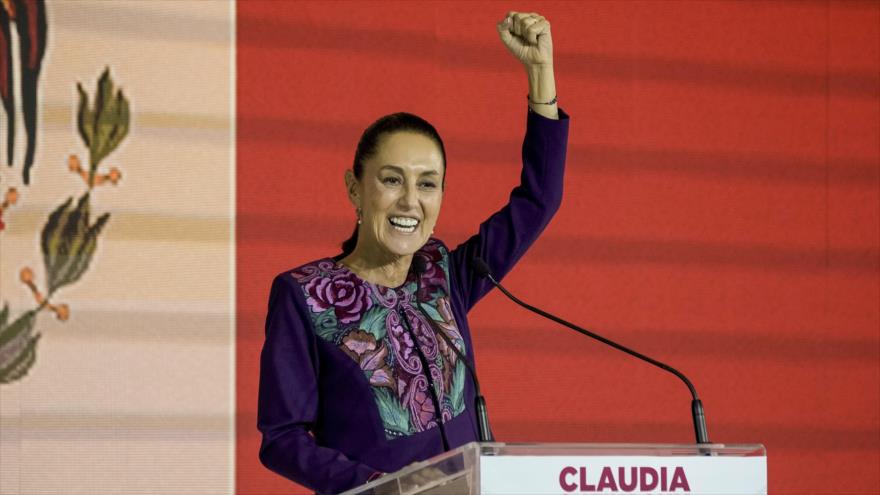Following the overwhelming victory of the ruling party’s Claudia Sheinbaum in last Sunday’s elections in Mexico, the week has been filled with reactions from all sides. The country’s financial markets initially reacted adversely, plunging the day after the election on Monday, June 3, although they have partially recovered throughout the week.
The market reaction was tied not so much to Sheinbaum’s victory but to the eventual composition of Congress. The ruling party appears to have won a relative majority, opening the door for constitutional changes without needing agreements with the opposition. Other reactions involved the international financial community, including a sovereign debt rating agency, investor stances, and effects on banks heavily exposed to the Mexican economy.
Moody’s Ratings Awaits Signals
“The victory of Sheinbaum and the expected composition of Congress reinforce the outlook not just for continuity, and this has several implications,” noted the rating agency. “Moody’s Ratings expects that Sheinbaum’s policies will become clearer and signal whether she will preserve, reinforce, or reverse the trends that have begun to deteriorate Mexico’s credit profile,” it stated.
The agency highlighted several key issues for the next administration that will help determine the sovereign credit outlook:
Macroeconomic Policies: Moody’s expects Sheinbaum to maintain the current president’s austerity rhetoric, with presidential projects continuing to dictate spending objectives. However, it remains to be seen how committed she will be to fiscal austerity, especially regarding a significant reduction of the fiscal deficit, which this year will exceed 5% of GDP. Importantly, there will need to be measures to keep the deficit at levels recorded in previous years, between 2% and 3% of GDP.
Energy Sector: The agency foresees that the authorities will maintain their commitment to energy sovereignty and the dominant role of the state, with no changes to Pemex’s business model or the government’s financial support. An operation increasing Pemex’s financial obligations in 2025-26, such as debt buybacks at a discount, is now more likely with the new administration.
Social Policies: Moody’s expects the incoming government to expand the reach of social programs and preserve the universal and unconditional nature of federal transfers. Sheinbaum repeatedly stated during her campaign that the next government would make these programs constitutional mandates, which would further reduce fiscal flexibility, as rigid spending categories already account for about 80% of total public spending.
Mexico has undergone a significant change not just in the presidential mandate but in the composition of Congress. Moody’s announced it is waiting for relevant signals from the incoming president to make decisions regarding the country’s credit profile.
Risk for Investors
Thomas Haugaard, a portfolio manager for Emerging Markets Debt at Janus Henderson Investors, released a brief analysis on investor sentiment following the Mexican election results. According to Haugaard, Sheinbaum’s election could be more positive since she is considered more pragmatic than the current president.
However, the ruling party is also on track to capture more seats in Congress. Initial counts suggest that Morena and its allies could secure enough seats in the Senate and the House of Representatives, approaching a constitutional majority in the House.
This level of political control is a concern for investors, as it raises the possibility of new policies that could undermine checks and balances on AMLO, Sheinbaum, and Morena. Given the tight political balance in Congress, we must wait for the final counts later this week. Meanwhile, uncertainty dominates the markets in the hours following the election, with investors awaiting more clarity.
Finance Minister Reassures Markets
On Tuesday, the Secretary of Finance and Public Credit (SHCP), Rogelio Ramírez de la O, who will remain in office under the new president, sought to calm the markets.
He assured that Mexico would not deviate from fiscal discipline and would aim to reduce the deficit next year to 3% from a previous 5.8% left by the current administration. Mexican markets have seen a “rebound effect,” but uncertainty remains as they await announcements from the new president and the official composition of Congress.
Spanish Banking Giants Feel the Impact
Spain’s two most international banking groups, BBVA and Santander, experienced a rough week in their stock prices, with one of the main causes being the election results in Mexico. More than Sheinbaum’s victory, the markets fear the ruling party’s dominance in Congress, which opens the door for constitutional changes without needing to consult or negotiate with the opposition, potentially impacting the banking business.
BBVA and Santander are highly dependent on the Latin American region, particularly Mexico. According to recent figures, BBVA is the most at risk, with 56.5% of its net profit coming from the Latin American country. “For many years, BBVA has had a clear stake in the Mexican economy, and any adverse movement could impact its earnings,” said Javier Cabrera, an analyst at XTB.
“At XTB’s analysis team, we believe that if a new tax is eventually imposed in Mexico, it would significantly affect Spain’s two most global banks, BBVA and Santander, especially BBVA, which has a large dependence on the region,” the expert added.
Although the current government had a distant relationship with the banking sector, it maintained the same conditions and allowed the banks to develop their business. Analysts fear this scenario could change with a ruling-party-dominated Congress without counterbalances.



